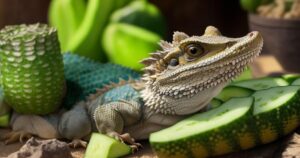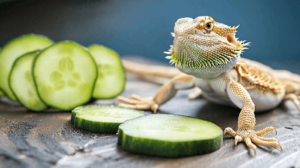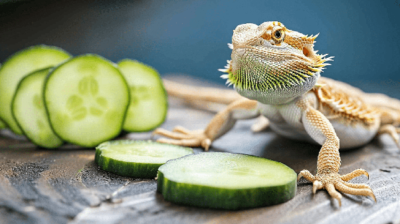Curiosity often arises among reptile enthusiasts regarding the dietary preferences and restrictions of their scaly companions. Among the myriad of inquiries, one frequently pondered question is, “Can bearded dragons eat cucumber?” In the realm of reptile nutrition, understanding the compatibility of certain foods with these fascinating creatures is paramount to ensuring their health and well-being.
Yes, bearded dragons can eat cucumber, but it should only be given to them occasionally and in moderation. While cucumber is not toxic to bearded dragons, it lacks many essential nutrients and can cause digestive issues if fed excessively. Additionally, cucumber has a high water content, which can lead to diarrhea if consumed in large quantities.
It’s best to offer cucumber as an occasional treat rather than a staple in their diet. Be sure to remove any seeds and peel the cucumber before feeding it to your bearded dragon, as these parts can be difficult for them to digest. Always supplement their diet with a variety of other vegetables, fruits, and insects to ensure they receive a balanced and nutritious diet.
Can bearded dragons eat cucumber?

Bearded dragons can eat cucumber, but it’s not the best option for their diet. While cucumber is not toxic to bearded dragons, it’s low in nutritional value and high in water content. Bearded dragons need a diet that’s high in protein and calcium, which they mainly get from insects and leafy greens.
Feeding too much cucumber to your bearded dragon can lead to digestive issues or diarrhea due to its high water content and low nutritional value. It’s best to offer cucumber only as an occasional treat and ensure that the majority of their diet consists of appropriate staples like insects, dark leafy greens, and other vegetables.
Remember to always provide a varied diet to ensure your bearded dragon gets all the essential nutrients they need for good health.
Nutritional Needs of Bearded Dragons
Bearded dragons require a balanced diet to thrive. Here’s a breakdown of their nutritional needs:
- Protein: Bearded dragons are omnivores, meaning they eat both animal and plant matter. They require a significant portion of their diet to come from protein sources, which primarily come from insects. Crickets, mealworms, Dubia roaches, and black soldier fly larvae are commonly fed insects. These insects should be appropriately sized for the dragon’s age and size.
- Vegetables: Dark, leafy greens should make up a substantial portion of a bearded dragon’s diet. These greens are rich in essential vitamins and minerals such as calcium, which is crucial for bone health. Examples include collard greens, mustard greens, turnip greens, dandelion greens, and kale. Other vegetables like squash, bell peppers, and carrots can also be offered in moderation.
- Calcium: Calcium is essential for bearded dragons, especially for proper bone growth and development. In addition to calcium-rich vegetables, you can provide a calcium supplement dusted onto their insects a few times a week. It’s essential to balance calcium with phosphorus in their diet, as an imbalance can lead to health issues like metabolic bone disease.
- Vitamin D3: Bearded dragons need access to UVB light to properly synthesize vitamin D3, which is necessary for calcium absorption. Providing a UVB light source in their enclosure is crucial for their overall health.
- Water: While bearded dragons get some moisture from their food, they also need access to clean, fresh water. However, they might not drink from a water dish regularly, so it’s essential to ensure they stay hydrated through foods with high water content, occasional misting, or offering water through a syringe.
- Fruits: Fruits can be offered as occasional treats due to their high sugar content. Examples include strawberries, blueberries, and melons. However, fruits should only make up a small portion of their diet compared to vegetables.
It’s important to provide a varied diet to meet all of a bearded dragon’s nutritional needs. Monitoring their health and behavior regularly can help you adjust their diet as needed to ensure they remain healthy and happy.
Comparison of cucumber nutrients to the dietary needs of bearded dragons
Bearded dragons have specific dietary requirements that need to be met for optimal health. While cucumbers can be offered to bearded dragons occasionally, they should not be a staple food due to their low nutritional value compared to the needs of bearded dragons.
Here’s a comparison:
- Moisture Content: Cucumbers have a high moisture content, which can be beneficial for hydration in bearded dragons. However, too much moisture can lead to digestive issues.
- Nutritional Value: Cucumbers are primarily composed of water and have low levels of essential nutrients required by bearded dragons such as protein, calcium, and vitamins. Bearded dragons require a diet high in calcium and moderate in protein to support growth, bone health, and overall well-being.
- Calcium to Phosphorus Ratio: Bearded dragons need a diet with a calcium to phosphorus ratio of about 2:1 to prevent metabolic bone disease. Cucumbers have negligible amounts of calcium and phosphorus, so they don’t contribute significantly to this ratio.
- Vitamins and Minerals: Bearded dragons require vitamins and minerals such as vitamin A, vitamin D3, and others for proper growth and health. While cucumbers contain some vitamins and minerals, they are not as rich in these nutrients as other vegetables and insects that should be staples in a bearded dragon’s diet.
- Fiber: Cucumbers contain fiber, which can aid in digestion. However, excessive fiber intake can lead to digestive issues in bearded dragons.
Benefits of Feeding Cucumber to Bearded Dragons
Feeding cucumbers to bearded dragons can offer some benefits, but it’s essential to do so in moderation and as part of a balanced diet. Here are some potential benefits:
- Hydration: Cucumbers have a high water content, which can help keep bearded dragons hydrated, especially in hot weather or if they are not drinking enough water.
- Variety: Offering cucumbers occasionally can add variety to a bearded dragon’s diet, preventing dietary boredom and encouraging them to eat a wider range of foods.
- Low in Oxalates: Cucumbers are low in oxalates compared to some other vegetables. Oxalates can bind to calcium, potentially reducing its absorption, so feeding low-oxalate foods like cucumbers can be beneficial in maintaining calcium metabolism.
- Easy to Digest: Cucumbers are relatively easy to digest, making them suitable for bearded dragons with sensitive digestive systems or those recovering from illness.
- Snack Option: Cucumbers can serve as a healthy snack for bearded dragons when offered in small, appropriate portions.
While these benefits exist, it’s crucial to emphasize that cucumbers should not be the main component of a bearded dragon’s diet. They lack many essential nutrients required for optimal health and should be supplemented with a variety of vegetables, leafy greens, and insects to ensure a well-rounded diet.
Overfeeding cucumbers can also lead to digestive issues due to their high water content and low nutritional value. Always offer cucumbers as part of a diverse and balanced diet for your bearded dragon.
Risks of Feeding Cucumber to Bearded Dragons
Feeding cucumbers to bearded dragons can pose certain risks if done excessively or without considering their nutritional content. Here are some potential risks:
- Nutritional Deficiency: Cucumbers are low in essential nutrients such as protein, calcium, and vitamins that are crucial for the health of bearded dragons. If fed too often or in large quantities, they may lead to nutritional deficiencies and health problems over time.
- High Water Content: While hydration is important, excessive water intake from cucumbers can lead to watery stools, diarrhea, and dehydration if not balanced with other foods. Bearded dragons are adapted to arid environments and may not handle excessive moisture well.
- Imbalanced Calcium to Phosphorus Ratio: Bearded dragons require a diet with a proper calcium to phosphorus ratio to prevent metabolic bone disease. Cucumbers have minimal calcium and phosphorus content, which can upset this balance if fed in large amounts without supplementation.
- Digestive Issues: The high water content and low fiber content of cucumbers may lead to digestive issues such as diarrhea, bloating, or gastrointestinal discomfort, especially if the bearded dragon’s diet is not varied enough.
- Oxalates: While cucumbers are relatively low in oxalates compared to some other vegetables, they still contain them. Oxalates can bind to calcium, potentially reducing its absorption and leading to calcium deficiency over time if fed excessively.
- Preference for Unhealthy Foods: Offering cucumbers too frequently may cause bearded dragons to develop a preference for less nutritious foods over those that are essential for their health.
To mitigate these risks, cucumbers should be offered only occasionally and in small amounts as part of a varied and balanced diet. They should not replace staple foods such as leafy greens, vegetables high in calcium, and appropriately sized insects. Always monitor your bearded dragon’s health and adjust their diet as needed to ensure they receive the necessary nutrients for optimal well-being.
How to Feed Cucumber to Bearded Dragons Safely

Feeding cucumber to bearded dragons can be done safely when done in moderation and as part of a balanced diet. Here are some guidelines to ensure safe feeding:
- Offer Small Portions: Cut cucumber into small, bite-sized pieces appropriate for your bearded dragon’s size. This helps prevent choking and ensures they can easily consume the cucumber.
- Occasional Treat: Use cucumber as an occasional treat rather than a staple food. Offer it once or twice a week at most to add variety to their diet.
- Balance with Nutritious Foods: Cucumber should not replace staple foods like leafy greens, vegetables high in calcium (such as collard greens and mustard greens), and appropriately sized insects. Ensure the majority of their diet consists of these nutrient-rich foods.
- Supplement with Calcium: Since cucumbers are low in calcium, it’s important to supplement your bearded dragon’s diet with calcium powder. Dusting their food with calcium powder before feeding can help ensure they receive enough calcium.
- Monitor Hydration: While cucumbers can help with hydration, monitor your bearded dragon’s water intake and urination. If they are consuming excessive water or have watery stools, reduce the amount of cucumber offered.
- Avoid Pesticides and Herbicides: When offering cucumber to your bearded dragon, ensure it is thoroughly washed to remove any pesticide or herbicide residues that could be harmful to their health.
- Observe Digestive Health: Keep an eye on your bearded dragon’s digestive health after feeding cucumber. If you notice any signs of digestive issues such as diarrhea, bloating, or decreased appetite, reduce or eliminate cucumber from their diet.
- Variety is Key: Offer a variety of fruits, vegetables, and insects to ensure your bearded dragon receives a balanced diet with all the necessary nutrients.
By following these guidelines, you can safely incorporate cucumber into your bearded dragon’s diet as an occasional treat while ensuring they receive the nutrition they need for optimal health.
Alternatives to Cucumber for Bearded Dragons
There are several alternatives to cucumber that you can offer to your bearded dragon to provide variety and essential nutrients in their diet. Here are some options:
- Dark Leafy Greens: Leafy greens such as collard greens, mustard greens, kale, and dandelion greens are excellent sources of vitamins, minerals, and fiber for bearded dragons. These greens should make up a significant portion of their diet.
- Bell Peppers: Bell peppers are rich in vitamin C and provide a crunchy texture that many bearded dragons enjoy. They come in various colors, offering visual variety and different nutrients.
- Squash: Yellow squash and zucchini are nutritious options for bearded dragons. They are high in water content, providing hydration, and offer vitamins and minerals.
- Carrots: Carrots are a good source of beta-carotene and vitamin A, which are essential for eye health and immune function. Offer them in moderation due to their sugar content.
- Green Beans: Green beans are low in oxalates and provide fiber and some vitamins and minerals. They are a crunchy option that can add variety to your bearded dragon’s diet.
- Butternut Squash: Butternut squash is rich in vitamins A and C, as well as fiber. It has a slightly sweet flavor that many bearded dragons enjoy.
- Turnip Greens: Turnip greens are another nutritious leafy green option that provides vitamins, minerals, and fiber.
- Insects: In addition to vegetables, insects such as crickets, dubia roaches, mealworms, and superworms are essential sources of protein for bearded dragons. They should be offered as part of a balanced diet.
- Fruits: Offer fruits such as berries, apples, and melons as occasional treats due to their higher sugar content. These fruits provide vitamins and antioxidants.
When offering these alternatives, ensure they are appropriately sized for your bearded dragon’s age and size, and always wash them thoroughly to remove any pesticide residues. Rotate the variety of foods offered to provide a well-rounded diet and prevent dietary boredom.
Conclusion
Can bearded dragons eat cucumber? While cucumbers can be offered to bearded dragons occasionally as a hydrating snack, they should not be a staple food in their diet. Cucumbers lack essential nutrients such as protein, calcium, and vitamins required for optimal health.
Offering cucumber in moderation alongside a varied diet of dark leafy greens, vegetables high in calcium, and appropriately sized insects is crucial for meeting the nutritional needs of bearded dragons. It’s essential to prioritize balance and variety to ensure the overall well-being of your bearded dragon.

